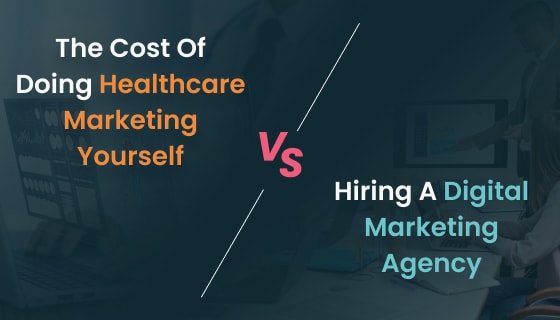Building patient trust and loyalty means meeting patients where they are – both in their healthcare journeys and how they engage digitally. Today’s healthcare leaders find that data is more than just numbers; it’s the key to crafting experiences that meet and anticipate patient needs. But here’s the challenge: where to start, and how to get it right?
Let’s explore how healthcare organizations can transform data into a transformative tool, breaking down the complexity of data-driven strategies to deliver more precise insights and healthier patient outcomes. Adopting a data-driven approach can solve healthcare providers’ everyday hurdles, enhance patient trust and satisfaction, and bring measurable value back to the organization.
Here’s a look at what your data might say – if only you knew how to listen.
Understanding User Behavior: Insights Beyond Clicks
Patients engage across numerous digital touchpoints in today’s healthcare landscape—from scrolling through health blogs to exploring social media posts. However, understanding what draws them in or causes them to lose interest goes more profound than merely tracking clicks.
By applying insights from user behavior analysis, healthcare brands can interpret these digital interactions as narratives, each offering valuable clues about patient needs and preferences. This approach shifts the focus from superficial metrics to meaningful insights that enhance patient engagement and retention.
Imagine foreseeing what your patients are searching for before they even articulate it. With the correct data, healthcare organizations can tailor their digital experiences to anticipate these needs, creating more relevant and personalized interactions.
The benefits of embracing user behavior insights include:
- Enhanced Patient Engagement: By understanding what resonates with patients, organizations can craft content and experiences that truly connect, fostering a more profound sense of involvement.
- Improved Patient Retention: Anticipating patient needs leads to more satisfactory experiences, encouraging individuals to return for ongoing care.
- Data-Driven Decision Making: Leveraging user behavior insights empowers organizations to make informed decisions about their digital strategies, optimizing engagement efforts based on real-time data.
- Stronger Patient Relationships: A deeper understanding of patient preferences cultivates trust and loyalty, transforming the patient experience into a partnership in health.
Ultimately, understanding user behavior enriches connections with patients and drives them towards making informed decisions, enhancing their overall healthcare journey. By embracing the nuances of user behavior, healthcare organizations can navigate the complexities of patient needs and foster a culture of responsiveness that resonates throughout the patient journey.
Optimizing Conversion Rates: From Visitors To Engaged Patients
In today’s competitive healthcare environment, organizations frequently grapple with low conversion rates, where potential patients visit their websites but fail to take the next step toward engagement. This challenge often stems from unclear calls to action, cumbersome appointment scheduling processes, or a lack of personalized content that resonates with patient needs. Without a clear understanding of patient behavior on digital platforms, healthcare brands miss crucial patient acquisition and retention opportunities.
This is where Conversion Rate Optimization (CRO) Services come into play. By employing web analytics services, healthcare organizations can gain valuable insights into specific points where patients may drop off or encounter obstacles.
Here’s how it can benefit your healthcare organization:
- Enhanced Understanding of Patient Behavior: By analyzing user interactions, organizations can identify trends and patterns that reveal what patients want and need, enabling them to tailor their offerings effectively.
- Increased Conversion Rates: Clearer calls to action and simplified appointment scheduling processes can lead to higher conversion rates, turning casual visitors into engaged patients more likely to seek care.
- Personalized Patient Journeys: With data-driven insights, healthcare organizations can create personalized experiences that resonate with potential patients, enhancing their likelihood of engagement.
- Improved Patient Retention: By refining the user experience based on patient feedback and behavior, organizations can foster loyalty, encouraging patients to return for ongoing care.
- Maximized Marketing ROI: Understanding which digital strategies yield the best results allows organizations to allocate marketing resources more effectively, maximizing their return on investment.
By focusing on conversion rate optimization through web analytics services, healthcare organizations can transform their digital presence, turning visitors into engaged patients and ultimately fostering an environment where individuals feel supported and empowered in their healthcare journey.

Maximizing ROI: Making Every Marketing Dollar Count
In the healthcare sector, where budgets are often constrained, it is crucial to ensure that every dollar spent on marketing is purposeful. One significant pain point many organizations face is patient acquisition. Attracting new patients in a competitive landscape requires strategic marketing that resonates with their needs and preferences.
Understanding the return on investment (ROI) on marketing spend is essential for addressing this challenge. By analyzing which campaigns yield the highest engagement, healthcare brands can allocate resources effectively and ensure their marketing efforts are targeted where they matter most.
Investing in a strategic marketing framework allows organizations to tackle the patient acquisition issue head-on.
The advantages of leveraging optimized marketing strategies include:
- Enhanced Patient Acquisition: Attract new patients through tailored marketing efforts that speak directly to their needs.
- Improved Brand Awareness: Showcasing the value and services offered will build recognition in the community, making it easier for potential patients to choose your facility.
- Data-Driven Insights: Use analytics to refine targeting and messaging, ensuring marketing dollars are spent efficiently and effectively.
By maximizing ROI on marketing spend, healthcare organizations can turn the challenge of patient acquisition into an opportunity for growth and long-term success.
Decoding Traffic Sources: Understanding Patient Pathways
Are your patients finding you through search engines, referrals, or social media? Understanding where your traffic originates is crucial for effective patient acquisition. By analyzing traffic sources, healthcare brands can identify the channels that drive the most engagement, ensuring resources are allocated wisely and not wasted on ineffective pathways.
This data-driven approach enables organizations to reach patients meaningfully, making it easier for them to return and engage with your services. By focusing on the most impactful traffic sources, healthcare organizations can enhance both acquisition and retention over time.
The impact of decoding traffic sources:
- Targeted Marketing Efforts: By identifying the most effective channels, healthcare organizations can tailor their marketing strategies to focus on those that yield the best results, maximizing engagement.
- Informed Resource Allocation: Understanding patient pathways allows organizations to invest resources where they matter most, avoiding ineffective campaigns and enhancing overall marketing efficiency.
- Sustained Growth: Healthcare brands can establish a reliable foundation for ongoing patient engagement and acquisition by prioritizing high-impact routes and fostering long-term relationships.
- Enhanced Patient Experience: Recognizing where patients come from helps create a seamless experience that guides them through their healthcare journey, ensuring they feel supported and valued.
Ultimately, decoding traffic sources empowers healthcare organizations to navigate the complexities of patient pathways effectively. By leveraging this knowledge, brands can create meaningful interactions, driving growth and engagement in an increasingly competitive landscape.
Improving SEO Performance: Meeting Patients Where They Are
Patients turn to search engines daily for health information, making SEO essential for visibility and engagement. However, effective SEO goes beyond merely ranking for keywords; it’s about connecting with patients in their language and positioning your brand as a trusted source of information.
By focusing on actual patient search queries and common concerns, healthcare organizations can enhance the relevance of their content, ensuring they appear at the top of search results when patients need them most. This approach improves patient acquisition and builds a reputation as a reliable and accessible resource.
Here’s what optimizing performance can do for your organization
- Increased Visibility: By aligning content with patient search intent, healthcare brands can significantly boost their online presence, ensuring they are the first resource patients encounter.
- Enhanced Patient Trust: Establishing your brand as a trusted source of health information fosters credibility, encouraging patients to choose your services over competitors.
- Improved Patient Engagement: Relevant content that addresses patient concerns keeps individuals engaged and guides them toward further interactions with your brand.
- Sustainable Growth: A robust SEO strategy supports long-term patient acquisition and retention by continually attracting new visitors and converting them into loyal patients.
Ultimately, improving SEO performance enables healthcare organizations to meet patients at crucial points in their search journeys. By turning visibility into valuable connections, healthcare brands can foster long-term engagement, ensuring they are seen as vital partners in patients’ health journeys.
Comprehensive Data Analysis: The Bigger Picture In Clear Focus
With insights pouring in from various channels, it’s easy for healthcare organizations to feel overwhelmed. Comprehensive data analysis brings structure to this information, enabling brands to move from guesswork to informed decision-making. Instead of merely reacting to individual metrics, a big-picture approach reveals patterns that help create a seamless patient experience.
By viewing data as a connected web rather than isolated numbers, healthcare organizations can understand how each touchpoint—from the first click to patient follow-up—contributes to patient satisfaction and loyalty.
Here’s how comprehensive analysis transforms healthcare
- Informed Decision-Making: Say goodbye to guesswork! A structured analysis equips healthcare leaders with actionable insights, allowing them to make strategic decisions that elevate performance and drive results.
- Elevated Patient Experience: Imagine creating personalized journeys for each patient! Organizations can tailor experiences that resonate deeply by identifying interaction patterns that foster lasting connections.
- Proactive Patient Retention: Anticipate patient needs before they arise! A thorough understanding of the patient journey empowers healthcare providers to address potential pain points, ensuring satisfaction and loyalty.
- Strategic Insights for Growth: A holistic view of patient engagement unveils trends and insights that inform targeted strategies, driving acquisition and retention while propelling sustainable growth.
Ultimately, comprehensive data analysis equips healthcare organizations with the tools to shape strategies that prioritize patient retention and experience proactively. By focusing on the whole picture, brands can navigate the complexities of patient engagement, ensuring they deliver meaningful interactions that enhance overall satisfaction.
Leveraging A/B Testing: A Continuous Path To Improvement
Data isn’t static; it evolves as patients’ needs change. A/B testing provides healthcare brands with the flexibility to adapt, allowing them to trial different campaigns, messages, and layouts to determine what resonates most effectively with their audience. Whether adjusting a landing page or experimenting with various health tips, A/B testing ensures your strategy evolves alongside patient preferences.
Through continuous testing, healthcare organizations can remain responsive to patient needs, fostering personal and supportive interactions rather than relying on one-size-fits-all solutions.
By embracing A/B testing, healthcare organizations can achieve:
- Enhanced Responsiveness: Continuously testing and refining strategies allows for quick adjustments to changing patient preferences, ensuring messaging remains relevant.
- Improved Patient Engagement: Identifying what resonates most with patients leads to more targeted communication, enhancing overall engagement and interaction.
- Data-Driven Decision Making: Each test yields valuable insights into patient behavior and preferences, empowering organizations to make informed choices about their marketing strategies.
- Increased Trust and Loyalty: Demonstrating a commitment to understanding and meeting patient needs fosters trust, encouraging deeper patient engagement and loyalty.
Ultimately, leveraging A/B testing creates a continuous path to improvement, allowing healthcare organizations to uncover what truly matters to patients. By fine-tuning engagement strategies through data-driven insights, brands can enhance the patient experience and build lasting relationships.
Conclusion
Your data is more than a collection of metrics; it’s a conversation waiting to happen. Every insight, every pattern, and every outcome is a piece of the story that connects you to your patients. By understanding these stories—from where patients find you to why they stay—healthcare brands can create more than just marketing strategies. They’re building connections that last, resonate, and foster trust through better patient acquisition, engagement, retention, and an enhanced patient experience.
Are you curious about where your data might be guiding you? At ZealousWeb, we view each insight as a stepping stone toward stronger patient relationships and more strategic growth. With certifications and partnerships in web analytics, we bring expertise and a commitment to data-driven approaches that elevate healthcare websites, guiding brands toward measurable impact and lasting patient engagement.














